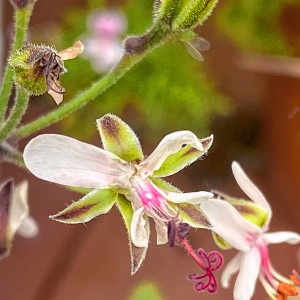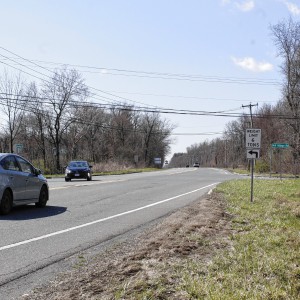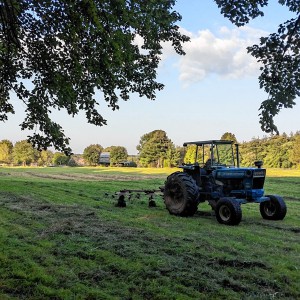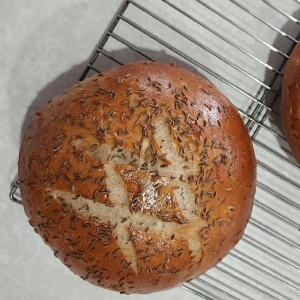Farmer food: Eating well and doing good
| Published: 06-09-2017 3:37 PM |
They came from Holyoke and Somerville and just down the road in Florence. Some had learned about the farm-to-table dinner at Crimson & Clover from friends, others from Facebook. At least two engaged couples were considering Wheelhouse, the Amherst-based food truck that would be preparing the meal, to cater their weddings, and they looked forward to a four-course meal featuring a salad of young kale and edible flowers and a Persian-inspired main dish of lamb seasoned with coriander and cardamom.
Along with their meals, all of the 51 guests who showed up this past Sunday at Crimson & Clover Farm on 215 Spring Street in Florence got a generous helping of information about the farm and the organization cohosting the dinner, Grow Food Northampton (GFN), a nonprofit that’s dedicated to promoting sustainable local agriculture as well as providing food access to low-income families in the area (the latter with the help of the Harvard Pilgrim Healthy Food Fund).
In addition to owning 120 acres of protected farmland (Crimson & Clover occupies approximately 50 of those acres ), GFN manages the Grow Food Northampton Organic Community Garden (on 140 Meadow Street in Florence), which last year helped two dozen low-income gardeners, including many Spanish-speaking residents, grow almost 2,000 pounds of food for their families. But many of tonight’s dinner guests weren’t aware of GFN’s connection to the community garden or its work with the federal Supplemental Nutrition Assistance Program (SNAP), which enables Crimson & Clover to offer discounted CSA shares to local low-income families.
“I had no idea,” said Jennifer Keenan-Jolie, associate director of financial aid at Holyoke Community College, who heard about the event through her friend Denese Gouvin, a private flight attendant. “That’s even better. I’ve done farm shares before and think that’s great because sometimes they’re a luxury reserved for people who have enough.”
At $60 a head, the dinner wasn’t cheap, but proceeds will help benefit SNAP share users who particpate in programs like the Red Bag Family Shares (for $2 a week for 10 weeks, families can pick up their veggies at the Jackson Street and Ryan Road elementary schools) and the Red Bag Senior Share (for as little as $1 a week for 10 or 15 weeks, seniors can get their greens and other produce at the Northampton Senior Center). Other SNAP participants can shop at the Tuesday Farmers Market in downtown Northampton or pick up their shares right at the farm.
There were no SNAP participants at Sunday’s event, but the hope is that this dinner and others like it will keep dinner on their tables for many more nights to come. The point of the farm dinner is to create awareness and raise funds. “Since this is our first farm-to-table event, we are just trying to cover our costs,” says Clem Clay, executive director of GFN. “We hope that the people who value local food enough to pay the $60 ticket price are also people who will want to support the many programs we have developed to strengthen the local food system. We also hope that, if this event is successful, we can add business sponsorships or other fundraising elements to future meals, so we can turn them into effective fundraisers in their own right.”
Crimson & Clover was a natural host for the dinner. Farmers Nathan Frigard and his wife, Jennifer Smith — better known as Nate and Jen — are the anchor tenants on the vast stretch of land (GFN also has leases with Joe Czajkowski Farm & Lakeside Organics, Sawmill Herb Farm, and Connecticut Valley Farms) and had to submit a five-year farm plan to lease 37 acres for 99 years (they opened in 2011). Their strong vision for a farm as a community base set them apart from several other applicants during a three-month selection process.
“We wanted to do work with volunteers, havingschool groups come to the farm and donating vegetables and finding ways to increase access to food for different populations,” says Frigard, 35, who is originally from Holliston in Eastern Massachusetts and met his future wife while working at a farm in northern Virginia in 2003; they later traveled together to different farms around the country, building skills such as learning how to drive a tractor, growing vegetables in different climates and managing farm crews. He eventually became the vegetable manager at The Farm School in Athol. Neither one came from farming backgrounds: Frigard studied philosophy at Elon University in North Carolina (“It’s in lots of crossword puzzles,” he says of his alma mater); Smith studied art history at Oberlin College in Ohio. Now in their seventh year, “We have about 350 families who come to the farm and pick up vegetables — many have been with us since our first year. I know most people’s names and faces and have seen their kids grow up. People who used to not have kids now have six year olds.”
Article continues after...
Yesterday's Most Read Articles
 South Hadley man fatally shot in attempted robbery
South Hadley man fatally shot in attempted robbery
 Smith College exhibit explores Sylvia Plath’s botanical inspiration
Smith College exhibit explores Sylvia Plath’s botanical inspiration
 Holyoke man finds bear paw in his yard
Holyoke man finds bear paw in his yard
 Guest columnist Bill Dwight: How to make sense of Northampton’s school budget dilemma
Guest columnist Bill Dwight: How to make sense of Northampton’s school budget dilemma
 South Hadley’s Lauren Marjanski signs National Letter of Intent to play soccer at Siena College
South Hadley’s Lauren Marjanski signs National Letter of Intent to play soccer at Siena College
 Deerfield residents petitioning to fix ‘dangerous’ intersection
Deerfield residents petitioning to fix ‘dangerous’ intersection
Frigard considers himself and Smith to be “stewards of the land.” But they are much more than that. With his strawberry blond hair in a curly pompadour, red flannel shirt and wedding ring encrusted in fresh dirt, he is the familiar face who greets the people who come to his farm and store, which also sells locally made honey by Red Barn Honey Company and popsicles by Crooked Stick Pops, thanks to a farm store wish list dreamed up by his son Noah, now four. “He hates vegetables,” Smith, Noah’s mother, recently lamented.
About 10 percent of their CSA shares belong to people who receive SNAP benefits. For Rebecca Martin, a single mother of two children who is disabled (she has extreme scoliosis), “it’s changed everything,” she said. When she started three years ago, “We were eating on the cheap — fast food, hot dogs and beans, not a lot of vegetables, certainly not fresh vegetables, and I wanted a change.” After a friend told her about SNAP, she decided to give it a try. “I nursed my baby in the field,” said Martin, who takes the bus to Lilly Library in Florence and then walks to the farm. “Being surrounded by that beauty and watching things grow as my baby grew was amazing. And for my older son, picking his own made him interested in food he would otherwise snub: ‘Oh, look, what’s a rutabaga? Let’s look it up!’ ”
Inspired by GFN’s efforts, Martin is now becoming more involved with food-access organizing, herself. “I wouldn’t have understood food disparity — I didn’t even know I had it — until I was not experiencing it, and I saw that other people don’t experience it and it’s not the norm,” she said. “The SNAP share helped me see that because every single other cent went to rent and diapers. All of a sudden having that bridge to fresh food brought me in.”
Other times people stop by to visit the land they remember from years ago. “We get adults who grew up here as kids, people who have known this land for longer than me come and share stories about what it meant to them,” Frigard said on a recent June day, as a rooster crowed nearby. “To me, that’s heartening to know. This place has value inherently, and by being here, we’re continuing to give it value. We’re always just trying to connect with people and share with them what farming is all about and what our farming life is like, with all of its imperfections.”
And there are plenty of imperfections. Although Smith was a critical part of running Crimson & Clover for a number of years, eventually she had to take an off-site job to better support the family financially. (She’s now the Biology Greenhouse Manager at Amherst College.) “Even with 20 acres of vegetables and 350 CSA members, all this is enough for a modest income for one person, but it’s not enough to sustain a whole family,” Frigard told the crowd during a drizzly pre-dinner tour of the farm.
“Things don’t always go as planned. Sorry about the weather,” Clay said, leading the umbrella-toting diners through rows of kale and cabbage in different succcesions, “but this is farming.” In the weeks before Sunday’s dinner, constant rain and even hail affected the crops and the menu. Frigard and Wheelhouse chef Will Van Heuvelen had to problem solve together, adapting to the temperamental weather. “The cold has been a curveball for sure,” Van Heuvelen said. At the last minute, the chef had to scrap his plans to use strawberries from Crimson & Clover (they weren’t ripe yet), but he dug up rhubarb from his own backyard for a galette topped with ginger-inflected crème fraîche. And an unusually wet spring brought gifts of its own, such as delicate broccolini, served alongside labneh (yogurt), spiced pickled beets and just-harvested French Breakfast radishes to munch on whole.
While this is GFN’s first farm dinner of the kind, Crimson & Clover has done it before—with Wheelhouse, which is co-owned by business director Jake Mazar, who met Van Heuvelen while working as apprentices on Brookfield Farm in Amherst. Wheelhouse, in turn, will be catering several more farm dinners throughout the summer and into the fall, when they will partner once again with GFN on September 10. “We have no idea what the menu will look like, but it will be during peak harvest season,” Clay says. “That meal is going to be at the community garden site on Meadow Street, and we hope it will be a showcase of ingredients grown by all the farmers we lease land to and many other Tuesday Market farmers.”
If Crimson & Clover is the anchor tenant and GFN the landlord, then how does Wheelhouse fit into the picture? “I think we’re the connectors. Prepared food is what connects humans to the land,” Mazar says. “There’s something really cool about being able to serve food that’s an immediate connection between a place and the people who depend on that place for our nourishment, happiness and survival.”
Despite the rain, the diners were not disappointed on Sunday night. Inside the barn, strangers sat together at long tables and discovered that they were, in fact, neighbors. In keeping with the BYOB invitation, one couple brought a home brew that they made with locally foraged ingredients and shared it with another couple, warning, “It’s kind of funky — in a good way.”
The same could be said of the evening, which ended with the young chef praising the power of a single, flowering broccolini. Still in his white apron, Van Heuvelen recalled what a farmer once told him – that the economy of man is one of scarcity, but the economy of nature is one of generosity. “One seed keeps replicating and replicating,” he said. “When you wrap your mind around it, it’s amazing how sustaining one seed can be.”

 Valley Bounty: Grass-fed animals that feed the grass: Gwydyr Farm in Southampton focuses on ‘restoring the connection between land, food and people’
Valley Bounty: Grass-fed animals that feed the grass: Gwydyr Farm in Southampton focuses on ‘restoring the connection between land, food and people’ Weekly Food Photo Contest: This week’s winner: Mary Chicoine of Easthampton
Weekly Food Photo Contest: This week’s winner: Mary Chicoine of Easthampton  Speaking of Nature: A romantic evening for two birders — To hear the wonderful sounds of the Saw-whet Owl one must go outside at night
Speaking of Nature: A romantic evening for two birders — To hear the wonderful sounds of the Saw-whet Owl one must go outside at night Speaking of Nature: Where have all the birds gone?: They’re there, and here’s a handy tool to keep track of their appearances
Speaking of Nature: Where have all the birds gone?: They’re there, and here’s a handy tool to keep track of their appearances
